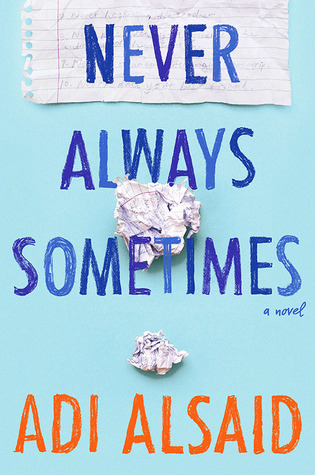Review:
 Title: Never Always Sometimes | Goodreads
Title: Never Always Sometimes | Goodreads
Author: Adi Alsaid
Publication: August 4th 2015 by Harlequin Teen
Source: Publisher
Format: ARC
Genre: YA; Romance; Contemporary
Best friends Dave and Julia were determined to never be cliché high school kids—the ones who sit at the same lunch table every day, dissecting the drama from homeroom and plotting their campaigns for prom king and queen. They even wrote their own Never List of everything they vowed they’d never, ever do in high school.
Some of the rules have been easy to follow, like #5, never dye your hair a color of the rainbow, or #7, never hook up with a teacher. But Dave has a secret: he’s broken rule #8, never pine silently after someone for the entirety of high school. It’s either that or break rule #10, never date your best friend. Dave has loved Julia for as long as he can remember.
Julia is beautiful, wild and impetuous. So when she suggests they do every Never on the list, Dave is happy to play along. He even dyes his hair an unfortunate shade of green. It starts as a joke, but then a funny thing happens: Dave and Julia discover that by skipping the clichés, they’ve actually been missing out on high school. And maybe even on love.
Thoughts:
I have a lot of mixed feelings about Never Always Sometimes–mostly because my initial thoughts and review thoughts are both sort of mixed. I suppose the correct thing to do, however, is start at the beginning.
I received this book from the publisher and of course in exchange for an honest review. My format was an ARC copy, but I cannot remember if I received it before or after it was formally released…(I’m leaning towards before). Well, anyway, at the start of the book we are introduced to our two protagonists: Dave and Julia. The book is told in dual POV, but instead of it going back and forth one of them takes the first half the book, the other the second. The premise of the novel circles around a set of rules that Dave and Julia (the best of friends) created early in their high school career as guidelines for themselves to prevent clichés. Quickly into the novel Dave and Julia both respectively agree to try and break these rules, however they plot of the troy did not revolve around the actual toying with clichés but instead their relationship.
Although the author did include aspects at times that I found extremely relatable from a high school perspective, these elements weren’t exactly present throughout the entire book. Dave and Julia also suffer a bit from the ‘absent parent’ phenomena (not entirely, but a little) which was a bit of a turn off in terms of believability.
In the beginning, I really liked Dave as a person and thought that he really had his head on straight. As the novel progressed, it seemed as if to me that he was actually moving backwards in progression. After finishing the novel and processing it, I’m mores satisfied with his development, but needless to say it is a little unconventional. Julia, on the other hand, was someone that I liked almost the entire novel but completely and utterly blindsided me with her foolishness by the end of the novel. Not to say that the characters actions weren’t poignant, it was just that I didn’t agree with what they did.
I think that my largest problem with Never Always Sometimes is that in part by playing with various high school clichés, it actually became one. I’m nots sure if this was the intention of the author, and I’m not saying that its a bad thing, but I was more than a little disappointed initially with the ending. Upon reflection (as I stated above), my view on the ending changed. I suppose my view on the book as a whole changed; I shifted to prefer the ending and dislike the beginning.
Final Thoughts:
Never Always Sometimes is cutesy, a little cliché, but surprisingly in the end redeems itself by teaching some of the most important lessons in high school
Other Opinions:


I’ve been excited to get around to this one for the longest time (I think I’m waiting until the end of this school year, though), so I’m glad to hear you enjoyed it despite the cliche/lack of believability. The absent parent phenomenon is quite annoying, but the character development sounds intriguing, and the plot sounds cliche in a non-cliche way, if that makes sense. I’m looking forward to seeing what I think! 🙂